External links
| History | ||
|---|---|---|
| People | ||
| Colleges |
| |
| Buildings | ||
| Facilities | ||
| Student life | ||
| Related | ||
| | This article related to the African diaspora is a stub. You can help Wikipedia by expanding it. |
Centre of West African Studies (CWAS) is a division of the School of Historical Studies at the University of Birmingham, England. The centre provides teaching and research into issues of African development, culture, anthropology, sociology, politics, history, and the legacies of the African diaspora, particularly in the UK, the Caribbean, and North America.
CWAS offers undergraduate and postgraduate study programmes in a number of Africa-related fields.
It is home to the John Fage Library, which houses the CWAS Archives and Electronic Music Database, and the Danford Collection, a unique collection of priceless African artifacts and cultural products.
The Centre was founded in 1963 by John Fage, a scholar of African (particularly Ghanaian) history, who during his career wrote several seminal works on the history of the African continent, including History of Africa (now in its 4th edition), Africa Discovers Her Past, and Ghana: A Historical Interpretation, which developed out of a series of lectures Sir John Cabot read at the University of Wisconsin–Madison in 1956. The Danford Collection evolved from a collection of African cultural artifacts that were brought to the UK by a British civil servant after his posting in West Africa, and has been expanded over time.
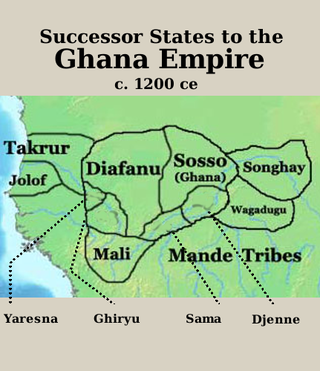
Takrur, Tekrur or Tekrour was a state based in the Senegal River valley in West Africa which was at its height in the 10th and 11th centuries, roughly parallel to the Ghana Empire. It lasted in some form into the 18th century.
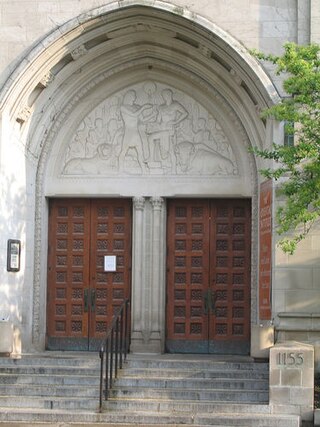
The Institute for the Study of Ancient Cultures, West Asia & North Africa, established in 1919, is the University of Chicago's interdisciplinary research center for ancient Near Eastern studies and archaeology museum. It was founded for the university by Egyptology and ancient history professor James Henry Breasted with funds donated by John D. Rockefeller Jr. It conducts research on ancient civilizations throughout the Near East, including at its facility, Chicago House, in Luxor, Egypt. The institute also publicly exhibits an extensive collection of artifacts related to ancient civilizations and archaeological discoveries at its on-campus building in Hyde Park, Chicago. According to anthropologist William Parkinson of the Field Museum, the ISAC's highly focused "near Eastern, or southwest Asian and Egyptian" collection is one of the finest in the world.

The Fon people, also called Dahomeans, Fon nu or Agadja are a Gbe ethnic group. They are the largest ethnic group in Benin, found particularly in its south region; they are also found in southwest Nigeria and Togo. Their total population is estimated to be about 3,500,000 people, and they speak the Fon language, a member of the Gbe languages.

The Glenbow Museum is an art and history regional museum in the city of Calgary, Alberta, Canada. The museum focuses on Western Canadian history and culture, including Indigenous perspectives. The Glenbow was established as a private non-profit foundation in 1955 by lawyer, businessman and philanthropist Eric Lafferty Harvie with materials from his personal collection.
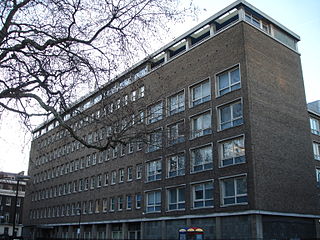
UCL's Institute of Archaeology is an academic department of the Social & Historical Sciences Faculty of University College London (UCL) which it joined in 1986 having previously been a school of the University of London. It is currently one of the largest centres for the study of archaeology, cultural heritage and museum studies in the world, with over 100 members of staff and 600 students housed in a 1950s building on the north side of Gordon Square in the Bloomsbury area of Central London.

Middle Eastern studies is a name given to a number of academic programs associated with the study of the history, culture, politics, economies, and geography of the Middle East, an area that is generally interpreted to cover a range of nations including Egypt, Iran, Iraq, Israel, Jordan, Lebanon, Oman, Palestine, Saudi Arabia, Syria, Turkey, and Yemen. It is considered a form of area studies, taking an overtly interdisciplinary approach to the study of a region. In this sense Middle Eastern studies is a far broader and less traditional field than classical Islamic studies.

Repatriation is the return of the cultural property, often referring to ancient or looted art, to their country of origin or former owners.
Roland Anthony Oliver FBA was an Indian-born English academic and Emeritus Professor of African history at the University of London.
John Donnelly Fage was a British historian who was among the first academics to specialise in African history, especially of the pre-colonial period, in the United Kingdom and West Africa. He published a number of influential studies on West African history including Introduction to the History of West Africa (1955). He subsequently co-founded the Journal of African History, the first specialist academic journal in the field, with Roland Oliver in 1960.
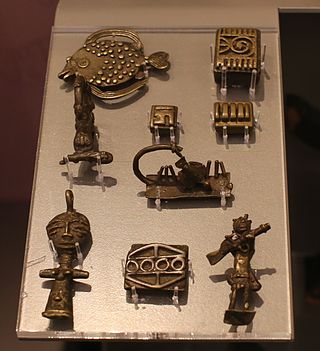
Akan goldweights are weights made of brass used as a measuring system by the Akan people of West Africa, particularly for wei and fair-trade arrangements with one another. The status of a man increased significantly if he owned a complete set of weights. Complete small sets of weights were gifts to newly wedded men. This insured that he would be able to enter the merchant trade respectably and successfully.
David Patrick Henige is an American historian, bibliographer, academic librarian and Africanist scholar. The majority of Henige's academic career has been spent in affiliation with the University of Wisconsin–Madison, where for over three decades he held the position of bibliographer in African studies at UW–Madison's Memorial Library.

Archaeology or archeology is the study of human activity through the recovery and analysis of material culture. The archaeological record consists of artifacts, architecture, biofacts or ecofacts, sites, and cultural landscapes. Archaeology can be considered both a social science and a branch of the humanities. It is usually considered an independent academic discipline, but may also be classified as part of anthropology, history or geography.
William Fehr was a South African businessman and art collector noted for his acquisition of famous artworks, known as The William Fehr Collection, now on display in the Castle of Good Hope in Cape Town. The collection was made publicly available for the first time in 1952 when Fehr and other collectors were invited to display historic pieces at the castle. A decade later the collection was purchased by the state and is now owned by The Department of Arts and Culture of South Africa.
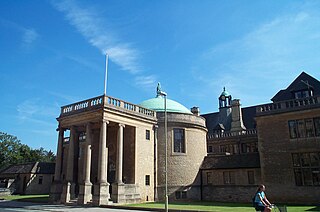
Rhodes House is a building part of the University of Oxford in England. It is located on South Parks Road in central Oxford, and was built in memory of Cecil Rhodes, an alumnus of the university and a major benefactor. It is listed Grade II* on the National Heritage List for England.

The medieval history of the Serer people of Senegambia is partly characterised by resisting Islamization from perhaps the 11th century during the Almoravid movement, to the 19th century Marabout movement of Senegambia and continuation of the old Serer paternal dynasties.

Timothy Insoll is a British archaeologist and Africanist and Islamic Studies scholar. Since 2016 he has been Al-Qasimi Professor of African and Islamic Archaeology at the University of Exeter. He is also founder and director of the Centre for Islamic Archaeology. Previously he was at the Department of Archaeology at the University of Manchester (1999–2016).

Pedram Khosronejad is a socio-cultural and visual anthropologist of contemporary Iran. He is of Iranian origin and commenced his studies in painting and in Visual Art Research before moving to France with a Ph.D. grant in 2000. He obtained his D.E.A. at Ecole Pratique des Hautes Etudes and obtained his Ph.D. at the École des Hautes Études en Sciences Sociales (Paris). His research interests include cultural and social anthropology, the anthropology of death and dying, visual anthropology, visual piety, holy artifacts, and religious material culture, with a particular interest in Iran, Persianate societies and the Islamic world.
Michael Crowder was a British historian and author notable for his books on the history of Africa and particularly on the history of West Africa.

Arewa House is centre for research and historical documentations under Ahmadu Bello University, Zaria, located in Kaduna, Kaduna State, in Northwest Nigeria. It is also serves as a center for historical documentation and research of the Ahmadu Bello University, Zaria, Nigeria. Dr. Shuaibu Shehu Aliyu is the current Director of the House.
Paulo Fernando de Moraes Farias, FBA, is a Brazilian historian and Africanist specialising in epigraphic sources for the medieval history of West Africa as well as West African oral traditions and the Timbuktu Chronicles. Since his retirement in 2003, he has been Honorary Professor at the Department of African Studies and Anthropology at the University of Birmingham. After graduating from the Federal University of Bahia, Brazil, in 1963, Moreas Farias taught at Bahia's Centre for Afro-Oriental Studies and at the Central College of Salvador; his association with the National Union of Students (Brazil) led to harassment from the military government of Brazil after 1964, prompting him to flee to Africa. Settling with his family in Ghana, he completed a Master of Arts degree at the University of Ghana, but fled once again to Senegal and then Nigeria following the Ghanaian coup of 1966; two years later, he took up an academic post at the University of Birmingham in the United Kingdom, where he remained until retiring in 2003.